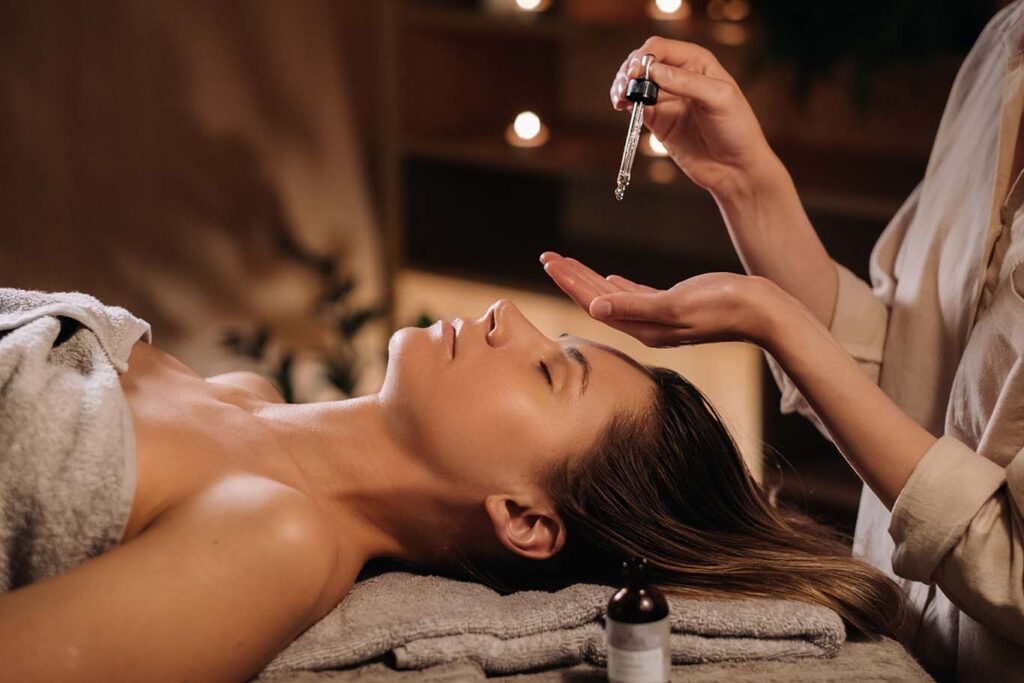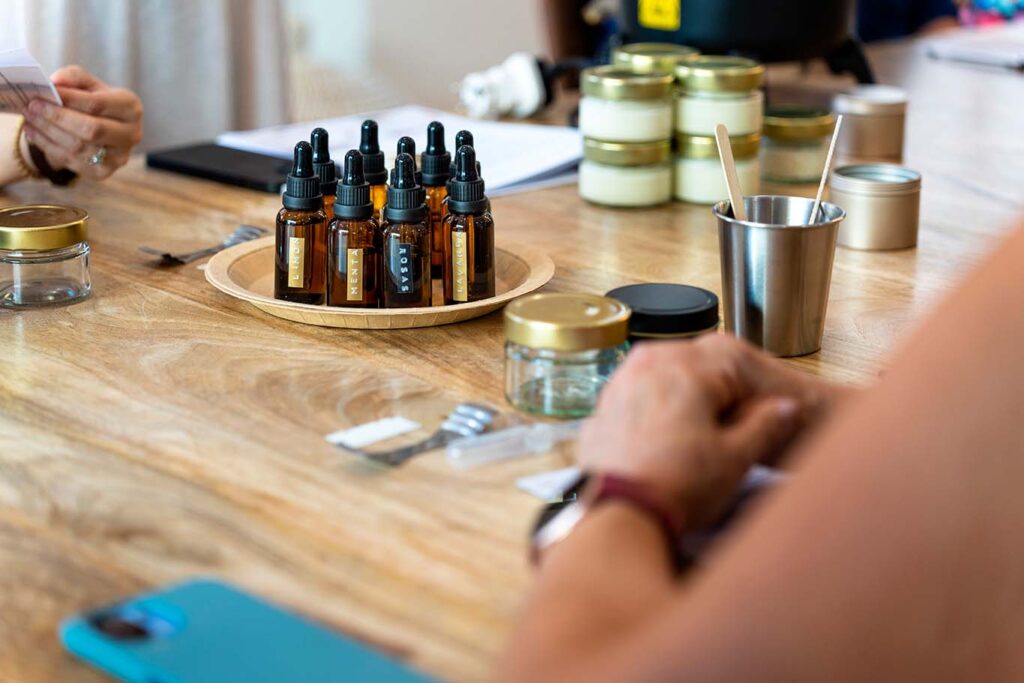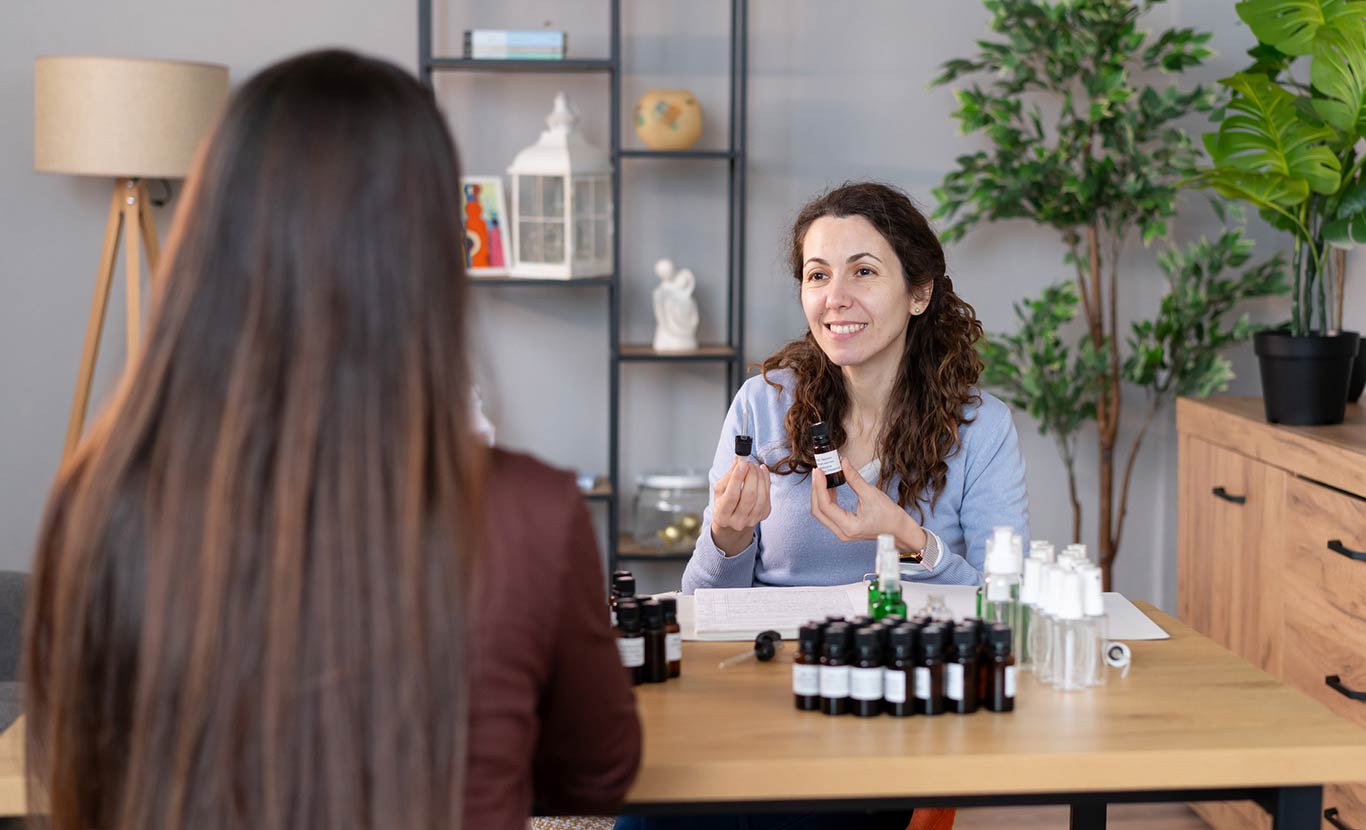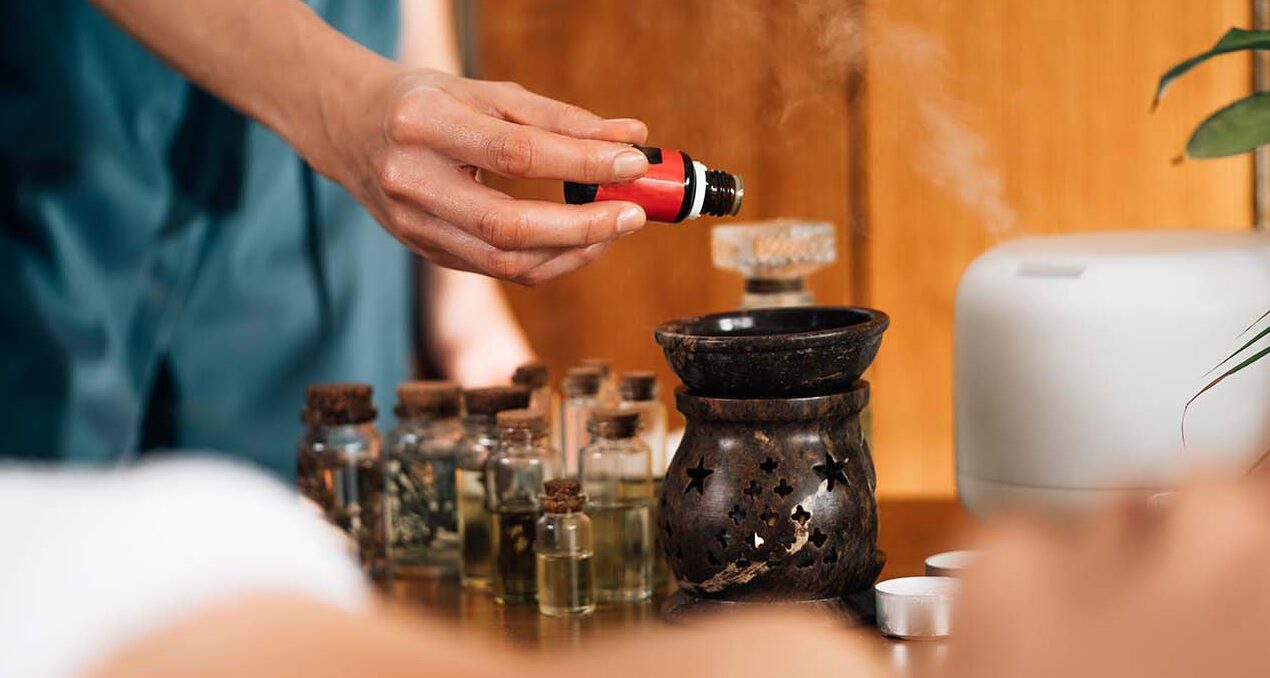In recent years, there’s been a noticeable shift in how people approach their wellbeing. Clients are no longer just looking for one-off treatments – they’re seeking immersive, multi-sensory experiences that support their emotional, physical, and energetic health. As a result, many holistic therapists are exploring new ways to deepen their practice and enhance their clients’ experience.
One powerful – and wonderfully aromatic – addition to the modern therapist’s toolkit is aromatherapy. Whether you’re a reflexologist, massage therapist, energy healer or yoga teacher, aromatherapy offers a natural, affordable, and effective way to complement the work you’re already doing.
So why is aromatherapy becoming so popular among therapists, and how can it benefit your clients and your business? Let’s explore.
What is Aromatherapy?
Aromatherapy is the therapeutic use of essential oils extracted from plants, flowers, roots, and herbs. These potent oils are used to support the mind, body and spirit – most commonly through inhalation, topical application or diffusion into the environment.
Each oil carries its own unique properties. For example, lavender is known for its calming effects, eucalyptus is often used to clear the airways, and sweet orange can uplift mood. When used mindfully and safely, essential oils can have a powerful effect on the nervous system, emotions, and even the immune system.
For holistic therapists, aromatherapy isn’t about replacing your existing modalities – it’s about enhancing them.
The growing popularity and demand for aromatherapy
Aromatherapy is no longer considered a niche interest. In the UK, it’s becoming an increasingly mainstream aspect of wellness culture – and client demand is rising accordingly.
With growing awareness around stress management, emotional wellbeing, and natural healing methods, more people are turning to therapies that engage the senses. Aromatherapy’s appeal lies in its ability to create a safe, soothing environment, while also offering tangible support for both mind and body.
In fact, you’ll now find essential oils used in everything from NHS palliative care units to luxury spas, yoga classes and even corporate wellness programmes. This increased exposure is translating into more clients actively seeking therapists who can offer aromatherapy as part of their treatments.
How aromatherapy enhances other therapeutic practices

One of the most exciting things about aromatherapy is how incredibly versatile it is. It can be used to elevate a wide range of therapies in both subtle and profound ways. Not only can it enrich your clients’ sensory experience, but it also adds a new dimension to your services – helping you stand out, deepen client relationships, and add value to your offerings.
Here’s how aromatherapy can integrate seamlessly with other practices, while supporting both client wellbeing and business growth:
Massage Therapy
Adding essential oils to your massage treatments doesn’t just make the experience more luxurious – it can actually increase therapeutic benefit. Oils like frankincense for grounding, chamomile for calming inflammation, or peppermint for muscle recovery can be blended into massage oils to tailor each session to your client’s needs.
Clients will often feel the difference immediately and appreciate the extra layer of care. Many are happy to pay a small supplement for aromatherapy massage, making it an easy way to enhance both the value of your treatments and your income per session.
Reflexology
Essential oils can amplify the calming and restorative effects of reflexology. A few drops diffused in the room or gently applied to the feet can help create a deeply centred and focused atmosphere. Oils such as bergamot or ylang ylang can support emotional release or aid clients in letting go of tension.
When used thoughtfully, aromatherapy can help clients enter a state of relaxation more quickly – which means your treatments may feel more effective and memorable. This can boost client satisfaction and increase repeat bookings.
Reiki and Energy Healing
Energy work is already a subtle, intuitive process – and adding scent can enhance the energetic experience. Aromatherapy helps to shift the emotional and vibrational tone of a session. Oils like sage, rose, or sandalwood can help clear, balance or uplift energy.
Many Reiki practitioners also use oils to anoint the chakras, cleanse the treatment space, or create a sense of ceremony. This sensory ritual deepens client connection and can help build a signature experience that keeps clients coming back.
Counselling or Coaching
While aromatherapy isn’t used diagnostically or to “treat” emotional issues, it can offer gentle, non-verbal support to clients in talking therapies. Scents such as lavender, neroli or mandarin can help ease anxiety, reduce overwhelm, or promote focus during sessions.
Even something as simple as a calming diffuser in your therapy room can create a more comforting environment – encouraging your clients to open up and feel safe. It’s a subtle touch that adds warmth to your space and leaves a lasting impression.
Yoga and Meditation
Aromatherapy can enhance breathwork, deepen relaxation, and encourage presence during yoga and meditation. Oils such as frankincense, lemongrass, or clary sage can help set the mood and intentions for a session.
Incorporating scent into your classes – either via room sprays, diffusers or mat spritzers – can add a sensory signature to your offerings. This small touch helps differentiate your practice from others and encourages brand recognition and loyalty.
Even just using a diffuser in your treatment room can create a nurturing sensory environment – and it doesn’t require any hands-on application.
How to incorporate aromatherapy into your practice

The beauty of aromatherapy is that it’s incredibly flexible. You don’t need to overhaul your entire practice or invest in dozens of oils to get started. In fact, most therapists begin with a few well-chosen oils and gradually build up as they gain confidence and see what resonates with their clients.
Here are a few simple, practical ways to introduce aromatherapy – each offering clear added value for your clients and extra income potential for your business:
Diffusion
Use a diffuser in your therapy room to subtly influence the mood – whether it’s calming, uplifting, or grounding. A relaxing scent can help clients shift gears before the session even begins. This sets the tone and helps your space feel more inviting and professional.
Clients will often comment on the scent, which can open conversations and build interest in aromatherapy add-ons.
Blended oils for massage or touch therapies
By creating bespoke massage blends, you can tailor treatments to clients’ physical or emotional needs. This level of personalisation makes your sessions feel more thoughtful and attentive – and many clients are willing to pay a premium for this.
Custom blends can be positioned as a luxury add-on or included in higher-priced packages, helping to increase your average session value.
Personalised take-home blends
Aftercare doesn’t have to stop at advice – you can create rollerballs, inhalers, or pillow sprays for clients to use between sessions. This keeps your practice in their daily routine, strengthens your client relationship, and creates an extra stream of revenue.
These make excellent upsells and can even be packaged as gifts or seasonal promotions.
Aromatherapy facials or hand massages
These make lovely stand-alone treatments or can be added onto longer sessions for a deeply relaxing experience. They’re especially popular with clients who want to unwind, or as taster sessions for those new to aromatherapy.
They’re also great entry-level offerings for events, markets, or wellness fairs – helping you attract new clients.
Workshops and Group Sessions
If you run yoga, meditation or wellbeing groups, aromatherapy can be a powerful enhancement. You might offer themed workshops like “Essential Oils for Stress” or “Aromatherapy for Sleep”, introducing clients to new tools they can use at home.
Workshops are an excellent way to position yourself as an expert, reach new audiences, and generate income outside of 1:1 work.
Start by choosing a few high-quality, ethically sourced essential oils and learn how they interact with the systems you support in your therapy work.
How aromatherapy can add to your profitability
Incorporating aromatherapy isn’t just good for your clients – it can also support the financial side of your practice. Here’s how:
- Add-on services: Offer aromatherapy as a supplement to existing treatments.
- Retail products: Sell pre-made or bespoke blends, diffusers, or gift sets.
- Workshops and online sessions: Teach clients how to use oils at home.
- Packages and memberships: Create signature treatments that include aromatherapy for added value.
- Differentiate your offering: Stand out in a crowded market by offering a multi-sensory, personalised experience.
Many therapists find that aromatherapy brings a new level of professionalism and care to their work, which can justify a higher price point and foster deeper client loyalty.
Training in Aromatherapy
If you’d like to integrate aromatherapy more formally into your practice, it’s important to choose the right training. Here are a few things to consider:
Accredited Courses
Look for courses accredited by bodies like the International Federation of Aromatherapists (IFA), International Federation of Professional Aromatherapists (IFPA) or the Complementary and Natural Healthcare Council (CNHC).
Types of Training
- Introductory workshops: Great for personal use or light integration.
- CPD-approved courses: For therapists looking to expand their toolkit.
- Full diplomas: For those wanting to practise aromatherapy as a standalone therapy.
Make sure your training is an approved provider and allows you to use oils professionally, as this could affect your insurance. Plus, you should always check the scope of practice if you’re combining it with touch-based therapies.
The FHT and CThA websites often list approved UK aromatherapy courses.
So, is aromatherapy the next step for your practice?
If you’re a holistic therapist looking to deepen your impact, broaden your toolkit, and enrich your client experience, aromatherapy offers a beautiful, accessible path forward. It’s rooted in ancient wisdom, backed by modern science, and full of possibilities – both for your clients’ wellbeing and your business growth.
Start small. Choose a few oils. Experiment with a diffuser or massage blend. You might be surprised how quickly both you and your clients fall in love with the power of scent.
Get Aromatherapy Insurance from Protectivity

*Disclaimer – This blog has been created as general information and should not be taken as advice. Make sure you have the correct level of insurance for your requirements and always review policy documentation. Information is factually accurate at the time of publishing but may have become out of date.
Last updated by

















